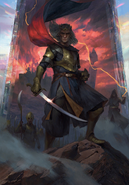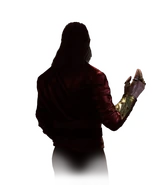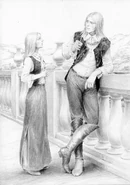| I have lived long, seen all, and I am bored with it. | |||
| - Gwent: The Witcher Card Game Audio version: | |||
Auberon Muircetach, King of the Alders, was the king of the Aen Elle elves, an Aen Saevherne, and ruler of Tir ná Lia. He was determined to "take back" what had been stolen from the Aen Elle by Cregennan when he took Lara Dorren, Auberon's daughter. To do this, he had Ciri, a descendant of the two lovers, brought to him and groomed to produce an heir. He was notably patient and never brutal, but nor would he be dissuaded from his goal.
He died before he was able to impregnate Ciri; killed, possibly unwittingly, possibly not, from an overdose of an aphrodisiac or performance enhancer at the age of over 650 years. The drug was supplied by Eredin Bréacc Glas, who viewed himself as a more suitable ruler.
The Witcher 3: Wild Hunt[]
Auberon Muircetach appeared only in a dream summoned by Corinne showing the moment shortly before his death. This vision was used to convince Ge'els to betray Eredin.
Journal entry[]
- Auberon Muircetach, also known as King of the Alders, was ruler of the far-off land of Tir ná Lia - the world which is home to Avallac'h and the Wild Hunt. He died after being poisoned by Eredin Bréacc Glas, who then declared himself king. At the time of his death Auberon had been exhausted and embittered by over six hundred and fifty years of living.
Associated quest[]
Trivia[]
- Auberon used the drug fisstech.
- In medieval and renaissance literature, Oberon, or Auberon, is the King of Fairies. He is a prominent character in A Midsummer Night's Dream by William Shakespeare.
- Another reference to classical literature may be Auberon's sobriquet "King of the Alders" which is a literal translation of Erlkönig - a mythical king of the fairies from the German and Scandinavian folklore. He is the antagonist of Johann Wolfgang von Goethe's 1782 poem of the same name.
- Auberon Muircetach's name was possibly inspired by the medieval Irish name Muirchertach, shared by multiple famous historical kings of Ireland.
References[]
- ↑ In all likelihood because during The Lady of the Lake, he calls Lara his "daughter".





